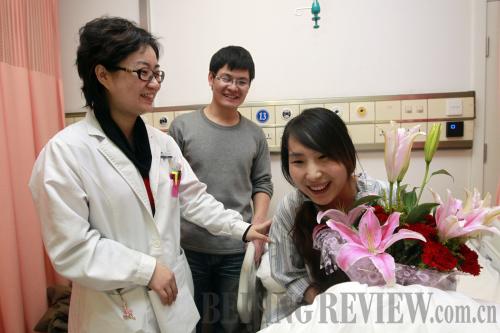|
 |
|
BACK TO LIFE: A migrant worker in Beijing smiles after a successful heart surgerty on February 16, 2012. Medtronic donated 150,000 yuan ($24,225) worth of cardiac defibrillators to the girl to ease her medical costs (REN ZHENGLAI) |
In November 2012, Medtronic completed its $755 million acquisition of Jiangsu-based China Kanghui Holdings, which specializes in implants to treat orthopedic conditions.
"An area of customization for Chinese patients is that certain clinical features can be different. Like in orthopedics, we find that certain structures are differently sized amongst Chinese patients. Products are now not customized to Chinese patients. That's an area I think we can differentiate ourselves in the Chinese market," said Ishrak.
"Through the Kanghui acquisition, we got access to over 100 engineers who spent decades understanding the unique needs of Chinese patients," said Ishrak.
In October 2012, Medtronic paid $46.6 million for a 19-percent stake in Shenzhen-based LifeTech Scientific Corp., which makes minimally invasive devices for cardiovascular and peripheral vascular diseases and disorders. Medtronic also bought a $19.6 million convertible note that amounts to another 7.4 percent equity stake. In exchange, Medtronic will obtain the right to sell Lifetech's current and future products.
"The investment and acquisition gave us an opportunity to participate in orthopedics and cardiology. We think that these types of products will address the majority of needs in China over time. So the growth prospects of these businesses are unquestionable," said Ishrak.
Besides intensive investment, mergers and acquisitions, Medtronic is trying to boost its local foothold by opening up research centers.
On August 8, 2010, the U.S. company launched a patient care center in Beijing. The center shares chronic disease and treatment knowledge with clients and is the first of its kind in the world.
In August 2012, the Medtronic Shanghai Innovation Center opened which is the company's first research and development facility outside the United States and Europe.
To serve the fast-growing Chinese healthcare sector, Medtronic will hire and train an additional 1,000 skilled workers over the next five years, hundreds of which will work toward the development of new medical technologies at the Shanghai Innovation Center.
"The objective of that innovation center is to create a facility and hire local engineers—or bring in engineers from other countries—to provide products that are geared to the Chinese market. It will be used as a platform to provide unique products for Chinese patients," said Ishrak.
Despite the alluring growth prospects, a few challenges loom over the horizon of Medtronic's Chinese foray, particular when it comes to investment or M&A options in the country.
"First, identify companies which truly have unique technologies. Second, identify a management team focused on the same mission that we are, on finding ways to provide better care to more people," said Ishrak.
Another issue is to convince its Chinese counterparts that Medtronic is committed to bringing change to healthcare in China.
"The biggest challenge is to convince our partners in China that we indeed want to partner with the government to provide better healthcare, and not simply sell our products and then go away," says Ishrak. "We're here for the long term."
Email us at: zhouxiaoyan@bjreview.com | 